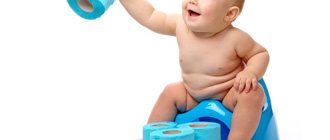Constipation disrupts the functioning of the gastrointestinal tract. The main manifestation of constipation is rare bowel movements and difficulty in emptying the intestinal tract. If bowel movements occur once every three days, but there is no bloating or discomfort, and the stool has a normal consistency, this is not considered constipation.
If your child suffers from constipation, you should consult a specialist. Initially, you should seek help from a gastroenterologist. The First Children's Medical Center employs the best pediatric gastroenterologists in Saratov: here you can get qualified medical care!
Constipation symptoms
The main symptoms of constipation include:
- rare bowel movements;
- if the child strains a lot when trying to go to the toilet;
- if there is pain during defecation;
- stool looks like balls.
When a baby is breastfed, he can have bowel movements up to seven times a day, after each meal. During the first week, the frequency of bowel movements is three times a day.
When the baby is one month old, he will have bowel movements every day. At two months of age and when complementary feeding begins, stool may be once every two days. If the baby's stool is soft, he feels good, but he defecates once every few days, this is normal.
Signs of constipation include: discomfort during bowel movements, moodiness, very hard stools. If this situation persists, you should contact your pediatrician.
It is important to adjust the feeding regimen. Do not overfeed the baby, do not transfer to artificial feeding if the mother has little milk. First you need to try to resolve the situation. A nursing mother should drink more fluids, avoid eating foods that cause flatulence and reduce intestinal motility. Only as a last resort should you switch to artificial mixtures.
If the child is bottle-fed, he should have a bowel movement once a day. The main mistake in this case is that parents often change formulas and try others. The mixtures should be adapted, fermented milk, containing probiotics and prebiotics. It is also necessary to strictly follow the instructions and dilute the mixture correctly, taking into account all proportions. The introduction of complementary foods should be within the prescribed time frame. The diet should contain foods that contain large amounts of fiber.
After the introduction of complementary foods, stools become formed, hard, and less frequent. Until the age of three, bowel movements should be daily. After three years, the frequency of bowel movements should be at least three times a week.
Psychological constipation
The topic of “poop” is one of the most discussed by young mothers. The composition, color, smell, and frequency of bowel movements signal the health of the baby, when he himself still cannot say anything. A promptly filled diaper or a “fragrant” potty makes any mother happy, confirming that the child’s body is working properly. Lack of stool is a sign of a malfunction in the body and a cause for parental concern.
If your child poops rarely (once every 2-3 days), tightly, but without pain, try to correct the situation with diet and physical activity, and monitor the amount of fluid consumed. But if the baby has become afraid of the potty, then this is a reason to seek advice from a pediatrician.
Psychological constipation in a child is a situation when the baby is afraid to poop. Unlike physiological constipation, the causes of which, as a rule, are diseases of the digestive system, the cause of psychological constipation in a child is the presence of internal experiences and fears. Typically, this problem occurs in children from two to three years of age, when they can already consciously restrain the urge to defecate. If it happened that the child was in pain, scared, ashamed, or uncomfortable sitting on the potty or toilet, then the baby may begin to independently restrain the urge to defecate, fearing a repetition of the negative experience.
The reasons for a child’s reluctance to have a bowel movement can be:
- forced potty training;
- punishment for soiled panties;
- unpleasant memories associated with visiting the toilet (for example, in a public place - in a kindergarten, in a shopping center, on a train or plane, etc.);
- pain during defecation.
The longer the child restrains the urge, the more feces will accumulate in the intestines and the more painful the process of defecation will be. If the problem is not solved in time, psychological constipation in a child can cause complications, such as: nausea, headache, abdominal pain (all this indicates intoxication of the body), inflammatory process in the intestines, rectal fissure, hemorrhoids, psychological stress, neurological problems .
Help your baby cope with fear by eliminating its cause. To avoid the pain of going to the toilet due to dense stool, adjust your child’s nutrition. Let your baby drink more (clean water, dried fruit compotes), include more laxative foods (prunes, beets, kiwi), fermented milk products in the diet, limit the child to flour and sweets, massage the tummy in a circular motion around the navel in a clockwise direction, do it with gymnastics as a child, play more outdoor games. If diet and physical activity do not bring results, then, as prescribed by your doctor, undergo a course of treatment with laxatives.
Don't scold your child for failures in potty training. Make the process non-scary, comfortable, or even fun and interesting. Buy a new “non-scary” potty or switch from a potty to a toilet seat cover and get rid of the unpleasant memories associated with going to the toilet. Come up with a fairy tale about poop, a ritual of taking out the potty or flushing the toilet.
A good way to relax during the process would be plasticine or dough, which you need to knead in your palms while sitting on the potty, this helps to relax the sphincter. Tell them that you don’t have to endure it, and when you want to go to the toilet, you need to “let the poop out in the potty.” Explain that this is not a shameful thing, but necessary and useful, and be sure to praise for the result. Now popular toys in the shape of poop or even cartoons about them can add fun to the process. If communication with the baby does not solve the problem, then seek help from a specialist. A child psychologist will help here, who, after talking with the parent, will tell you what to emphasize in a conversation with your baby.
When working with the youngest clients, our center’s specialists use techniques such as sand therapy and fairytale therapy. This approach has proven itself to be excellent for working with experiences that are difficult for children to share due to their age and characteristics of the topic. The techniques relieve anxiety and emotional stress, help neutralize traumatic memories and form a new positive scenario of action. A consultation for parents will help consolidate the results at home.
Example from practice. A family with a 3.5-year-old boy contacted the Center. The child did not go to the potty “in a big way” after suffering an illness at 1 year of age, accompanied by prolonged diarrhea. The boy avoided pooping until the last moment; he stooled about once a week in the diaper (the child specifically asked for a diaper, the rest of the time he did without it, including at night; he peed on the potty on his own). All persuasion to go to the potty ended in hysterics. The boy studied with a child psychologist (a course of sand therapy in the amount of 10 sessions, once a week). After the 6th session, the child sat on the potty at home and pooped himself, after which he called his mother to help with hygiene procedures. Subsequently, the result was consolidated, the boy walked independently every other day. Calmly discusses the topic in an everyday context (what needs to be done if you want to go to kindergarten; what needs to be done after the potty, and so on).
If your child has psychological constipation and you cannot cope with the problem on your own, sign up for a consultation with a child psychologist by phone. or leave a request on the website, we will definitely contact you!
Why does constipation occur?
There are two types of constipation - organic and functional. The causes of organic constipation are:
- Hirschsprung's disease;
- abnormalities in the development of the gastrointestinal tract;
- pathologies of the endocrine system;
- metabolic disorders.
In a newborn baby, such a symptom may indicate a narrowing, lengthening or expansion of the intestinal tract.
Causes of functional constipation include:
- psychological problems, such as being in an unfamiliar environment;
- lactose deficiency;
- lack of fluid in the body;
- errors in diet;
- negative reaction of the body to taking antibacterial drugs, drugs for the treatment of anemia, anticonvulsants;
- stagnation of bile in the gallbladder and its ducts;
- intestinal infection by worms.
In newborn children, the nervous system is immature, it is just being formed. Therefore, children are unable to control the movements of their muscles during bowel movements. You can help them by carefully bending their legs and pressing them to their tummy. With the help of these movements, the pelvic muscles relax, and the bowels are released much faster.
How is therapy carried out?
In the treatment of constipation, it is necessary to follow an integrated approach. Treatment is prescribed in each specific case individually, depending on the cause of constipation.
To ensure the normal functioning of all organs, it is necessary to regulate bowel movements in children. You will need to adjust your diet and lifestyle; you should not abuse laxatives, as they only help temporarily.
The basic principles of therapy include:
- Diet correction. It is necessary to eliminate foods that can cause constipation. Among them are fermented milk products, rice, baked goods, bakery products, and pasta. It is recommended to include vegetable fiber in the menu, which is found in fresh fruits and vegetables. You should also avoid fast carbohydrates – flour products, sweets. It is necessary to add to the menu more products that contain potassium, for example, figs, dried apricots, prunes.
- Maintain drinking regime. It is important to drink clean drinking water. During the day, the child should drink at least 40 milliliters of water per kilogram of his body weight.
- As prescribed by the doctor, you need to give the baby medications and homeopathic remedies. These include medications for the outflow of bile, drugs that restore intestinal microflora. You can use anthelmintics, laxatives, and medications containing lactulose. The doctor may also prescribe medications that contain polyethylene glycol. They retain moisture in the intestines and thin the stool.
- In case of prolonged constipation, the child can be given a glycerin suppository or a microenema as a stimulant.
- Undergo physiotherapy procedures prescribed by the doctor, massage, and do therapeutic exercises.
- Provide a calm environment, help the baby psychologically so that he is not afraid to empty his bowels. You can read fairy tales and play with your child.
- Train the intestines, after eating, sit the child on the potty for a few minutes.
First you need to get rid of constipation and only then potty train. If constipation is not treated promptly, this will lead to unpleasant consequences for the child’s health.
Psychological constipation in a child. How to help?
Unfortunately, many parents have to deal with such a problem as psychological constipation in a child . Many mothers and fathers are stunned by the current situation and only one question is spinning in their heads: what to do?
There is an exit. But first, let's understand what psychological constipation is.
Psychological constipation is when your baby wants to go to the potty, but restrains himself with all his strength and endures it. As a result, the feces harden, and a vicious circle results.
This situation can arise after an unsuccessful bowel movement: the baby was in pain, or a crack appeared, or there was unexpected diarrhea. Subsequently, the child, remembering the unpleasant situation, is afraid to poop and does his best to restrain the urge. As a rule, psychological constipation most often occurs in children 2-3 years old: children at this age have already learned to control their body, so they “control” it, thereby aggravating the situation. And no amount of persuasion or talking helps here: the child still remembers the pain and does not want it to happen again, endures it until the last moment, and when he can no longer endure it, he poops in his pants.
How to help a child overcome psychological constipation?
Be patient! In this situation, the child needs unlimited parental patience and love. This is the only way to solve the situation with psychological constipation. Plus a little parental organization. Now let's go into more detail.
Parents face two main tasks:
- Provide the child with soft, painless stools.
- Give the child psychological confidence that everything will be fine. Treat what is happening calmly, without lamentations, reproaches, without scolding the baby, without shaming.
Let me make a reservation right away that treatment of psychological constipation may take several months. I read different cases, there were also those in which it took the parents about a year. It all depends on the child, on his health and on the attitude of the parents.
The first task of parents is to prevent recurrence of pain and discomfort.
Every time your baby poops, he should have soft stools. Gradually, the baby will get used to the fact that pooping is easy, that after that the tummy becomes easier, and sooner or later he will begin to try to go to the potty on his own.
If psychological constipation occurs, be sure to visit a gastroenterologist. You will need to be tested for dysbacteriosis and scatology. A gastroenterologist can identify infections or a deficiency of lacto- and bifidobacteria and prescribe treatment. He will also recommend a therapeutic diet. Just don’t hope that this treatment will help you overcome psychological constipation, no, this is just additional help for the baby.
You will need to carefully monitor your child's diet:
- his diet should contain a lot of vegetables (fresh and stewed), beetroot soup, which I cooked every other day, helped us well;
- pumpkin juice, compotes of figs, dried apricots and prunes (in order for juices and compotes to have the desired effect, they must be taken on an empty stomach or 30 minutes after eating);
- you can’t get carried away with sweets; Eat no more than 1-3 cookies, and be sure to wash them down with water or tea;
- remember that kefir strengthens (the child can only be given fresh, one-day-old kefir and other fermented milk products);
- Make sure your child drinks a lot: lack of fluid in the body also causes constipation.
To strictly follow the diet, parents will most likely have to cheat a little. After all, many children do not want to eat vegetables. In this case, hide them in vegetable cutlets or vegetable soups. Does your child not want to eat vegetable soup? Turn it into puree soup. Doesn't want to drink a lot? Maybe your baby will like to drink from a bottle or through a straw. Experiment, and remember: when your baby poops, he should have soft stools.
In addition, try to have your baby go to the toilet every day, or at least every other day, so that the stool does not have time to harden. I repeat, compotes from dried fruits on an empty stomach and beetroot soup helped us to ensure regular bowel movements.
The second task is to give the child confidence that everything will be fine.
For a long time, the child will not go to the potty on his own. He will endure until the last, he will whine, cry, sob, run or sit and endure, until it becomes impossible to endure. And finally, with tears, he poops in his panties. And you should be there. You should praise the child that everything worked out for him, without focusing on how it turned out. It doesn’t matter where the baby poops now, the important thing is that he still poops. Praise, do not skimp on praise, kisses and caresses. Pay attention to the child that he feels better, that his tummy no longer hurts and is very happy.
Here, of course, everything depends on the child’s temperament, but every mother can always find an approach to her baby. It is important to remember: the child will not poop in his panties for the rest of his life, this is temporary, it will pass and there is no need to rush things. Praise for every small victory.
A mother must be a reliable protector for her child. Mom should be at the same time with him. I will say that the first time, when my daughter suffered for three days and was already at her limit, I held her legs tightly in the bathroom (pressing her back against me), and she managed to poop and it became much easier. But after that she was afraid to wash her butt for almost a week. I was helped by conversations, explanations and a firm promise that I would never do anything with my daughter if she didn’t want to. After that, she began to allow me to wash her. Do not do anything against the child's will. Be allies.
Additional help for a child with psychological constipation
In addition to diet, examination by a doctor and unlimited parental support, you can also help your baby indirectly. How? For example, with the help of fairy tales, stories and distracting activities.
Some people benefit from therapeutic fairy tales in treating psychological constipation. I told them to my daughter every day, and it should be noted that she really liked them, she often asked me to tell me a fairy tale about how Dasha released a poop. There was just no effect from them. My daughter understood everything, but the fear remained.
Here's another little secret for parents: playing with plasticine. If you see that your child is already suffering, play with plasticine. Let the child crumple it, roll it into balls and smear it on a piece of paper. This process greatly relaxes the muscles and distracts attention.
Recovery
Over time, the child will gradually forget about the pain. He will know that after bowel movement it becomes easier. When the situation is no longer so critical, when the child begins to poop in his panties almost without fear, start offering the baby a potty. Just not intrusive and easy, so as not to take a step back. First, let him go to it standing, or you and your child sit on the potty, or try to quickly take off your pants at moment X, put the potty on, and then rejoice together that the child did it! Rejoice sincerely! The baby will appreciate this, and together you will come to a solution to the problem of psychological constipation.
You will succeed! Health to you and your children.
Pediatric gastroenterologist: where to turn for help?
To get rid of this problem, you need to visit a pediatric gastroenterologist. First you need to find out why constipation occurs, adjust your diet, and then, depending on the cause, competent therapy is prescribed.
Contact the First Children's Medical Center: we have pediatric gastroenterologists who have experience working with children of all ages. We monitor the constant improvement of staff qualifications and offer the services of only highly qualified doctors.
You can make an appointment for a consultation from 8.00 to 20.00 by calling (8452) 244-000. Reception is by appointment only.









